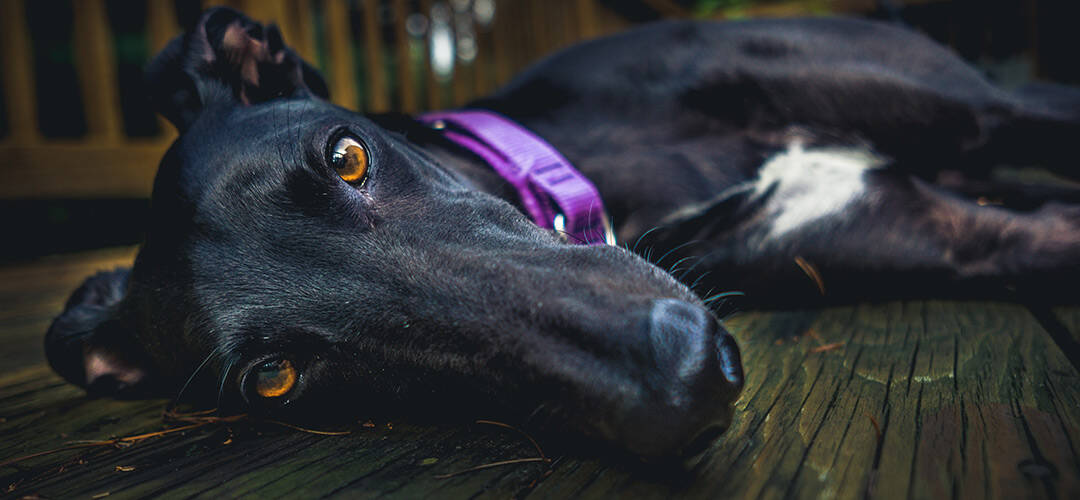Often called “the poor man’s racehorse,” Whippets were originally bred for speed and superb hunting skills. With short, thin coats and very little body fat, these dogs were never designed to be housed in outdoor kennels.
In fact, Whippets were so highly valued for their ability to put food on the table that they were raised right alongside the family indoors and treated to a pampered life complete with warm, cozy beds of their own.
Are Whippets good family dogs? Yes! Whippets are naturally affectionate, forming strong bonds with each family member both young and old. They are quiet and calm when indoors but energetic and playful outside. These gentle dogs get along very well with both children and dogs alike.
Deciding on just the right dog for your family can be daunting. A Whippet might be just what you’re looking for. In the following, we’ll cover what to expect with a puppy and how well Whippets do with children, other dogs, and cats.
Common Puppy Behavior
While Whippets are indeed a fantastic breed, they do, however, go through the typical puppy trials, just like all dogs do. As we look at typical puppy behavior, keep in mind that these issues are completely normal. Puppies are busy trying to figure out how the world around them works, their place in it, and what’s expected of them. They are solely acting on instinct, not purposely being “bad.” The owner’s responsibility is to assume the leadership role, train and socialize the puppy, and be patient during these formative months.
Socialization is critical for raising a well-adjusted Whippet. Their future ability to respond correctly in any situation depends on it.
What does normal puppy behavior consist of? Well, let’s take a look at common puppy issues that all dog breeds experience.
Exploring with their mouths
While certainly not pleasant for owners, mouthing and nipping are to be expected with any puppy. It is through these actions that puppies learn bite inhibition (the ability to control the power of their mouths). Although a puppy begins to learn this naturally when playing with his mother and littermates, the training must continue in his new home as well.
One of the most common issues with puppies is chewing, and teething is usually the root of the problem. Chair legs, slippers, remotes – anything to relieve the discomfort of new teeth pushing through the gums! The key to survival is to frequently offer a variety of different textured chew toys. Stick them in the freezer first to maximize the relief.
Owner Recommendations
To get through the puppy chewing phase, it’s best to have a variety of different toys and chews in various textures, for your pup to choose from.
- Red barn Bully Slices — These tasty treats give them something rewarding to chew on and are available on Amazon.
- Antler Chews — Real antlers like these or artificial ones last a long time and really give them a good outlet to focus their chewing.
- Puppy Chew Variety Pack — 12 different chews, many different textures, and all sized for a puppy mouth, this pack of toys is ideal to keep them entertained. It will also help you learn what kinds of toys they like best!
Jumping with joy
In their excitement, puppies often jump on people to greet them or gain attention. Sure, it may be cute when the puppy is tiny, but as the dog becomes bigger, this behavior becomes annoying and could result in scratched legs or in someone being knocked down – particularly an elderly person or young child. Nip this behavior in the bud early to prevent future problems.
Crying or whining
Puppies will often whine or cry when separated from their owners or are undergoing crate training. This is understandable when you consider all the recent, big changes in the young dog’s life. Do your best to ignore the whining and reward quiet, and this issue will soon resolve itself.
Rough play
Roughhousing is another common puppy issue. Sometimes puppies can get a little too carried away with their play and become too rough. Games like wrestling and tug-of-war often trigger such excitement that things soon become out of hand. When play gets too rough, stop the activity and let the puppy calm down for a bit before resuming the fun.
Puppies, and more mature dogs too, often contract a case of the “zoomies.” No, it’s not a weird new disease. Zoomies refers to a period of extreme energy that results in the dog dashing wildly around in circles until exhausted. Lap after lap, round and round with a rather crazed look in his eyes, the dog practically appears lit from within. Don’t worry though; it’s completely normal for a dog to release pent-up energy in this kooky way.
Like children, puppies sometimes test their limits and push every boundary given. This can be frustrating for sure, but remain patient, continue consistent training, and remember that each instance of rebellion is a teaching opportunity. Don’t waste it!
Whippet Temperament
Though it is true that genetics play a large role in the temperament of any dog, the manner in which the dog is raised, trained, and socialized factors into the equation as well. That said, the general Whippet temperament is widely praised. Let’s see why.
Whippets are known for being loyal, sweet-natured dogs. Highly affectionate, friendly, and docile, Whippets quickly make friends wherever they go. While these quiet, trusting, nonaggressive dogs may not be the best choice for work as guard dogs, they are, however, perfectly suited for the role of a family dog.
The Whippet is almost like two dogs in one. When playing outside, he’s an energetic, playful athlete who loves to run and enjoy games such as fetch and Frisbee. When indoors, he is calm, relaxed, and undemanding, desiring only your company and a comfy couch. The dual personality Whippet really is the best of both worlds!
Whippets can be independent thinkers (after all, they were bred to do just that when hunting) but are not usually stubborn or difficult to train.
This breed is also known for being somewhat sensitive both physically and emotionally. Like other sighthounds, Whippets are often sensitive to touch and may startle if given a surprise hug or unexpected pat. They don’t respond well to harsh treatment and their feelings can be easily hurt, so training methods should only consist of gentle, positive reinforcement.
By the age of two, most Whippets are fully mature and puppy related issues are a thing of the past. A well-raised and socialized Whippet is a dream to live with. Some might even say that a Whippet enhances the décor of your home when artfully draped across your furniture!
Whippets and Small Children
Whippets tend to get along famously with all family members including little ones. Strong, lasting bonds are formed during both playtime and snuggle time, provided that the children are taught how to properly behave around dogs.
Gentle and affectionate by nature, Whippets rarely show any aggression at all. If children become a little too rough or rowdy around their Whippet, the dog is much more likely to remove himself from the situation and find a quiet place to rest than he is to growl or snap. Supervision is always recommended of course, but generally, a Whippet can be an ideal buddy for a child.
Are Whippets Good With Other Dogs?
When properly socialized, Whippets are quite good with other dogs and delight in making new canine friends, most likely hoping to find another dog who enjoys running as much as they do.
Through the years, Whippets have retained somewhat of a pack mentality and therefore are often happier when living with another dog, especially if the house is empty for large portions of the day. Companionship is important to this breed, whether human or canine, so having a friend close by is always ideal.
Some breeders suggest bringing home two Whippets instead of just one because nothing can really keep up with a Whippet at play except of course … another Whippet.
Are Whippets Okay With Cats?
The answer here really depends on the dog. Some Whippets who have been raised with a cat and are well trained live in complete harmony with the family feline. For other Whippets, however, the story is quite different.
You see, Whippets have a high prey drive. Their instincts tell them that any furry creatures darting by should be chased. Sometimes, this instinct is so strong that no amount of training will ever be enough to completely guarantee a cat’s safety.
While it is possible for a Whippet to coexist peacefully with a cat, constant supervision is recommended and the two animals should be securely separated when owners leave the house. You’ll have to decide for yourself if it is worth the risk.
What Real Owners Are Saying…
“Our four-year-old female loves children when they’re predictable. Small, and rolling or crawling? She’ll happily exist near them. But a two or three-year-old? No way. I think the main fear is being hurt. She doesn’t want to be fallen on, or dragged down and they tend to fling and jump and flail in their movements. But when they sit with a book, she’ll curl up inches away and listen intently while they read to her.”
“I can’t speak for all whippets but my family got our girl when I was in my early teens and she had little to no contact with anyone younger than that for years. She’s about ten now and wonderful with my niece (2 years old) she was a little wary of her when she first started walking on her own but she’s incredibly patient with a wild toddler that absolutely adores her.”
“We got our Whippet as a Puppy and he is extremely gently and an overall great dog to my toddler. She is very young and most likely will warm up to your kids. If you teach your kids some ground rules about not being too rough with her it will likely work out, but I know that can be pretty impossible with toddlers sometimes
.”
“I got my whippet as a puppy, but she’s nothing but wonderful with kids. One of my kids has autism and the other one is undergoing evaluation for possibly adhd or autism and I’ve never had to worry about this dog with them, ever. If she doesn’t like what they’re doing, she just moves away… but generally puts up with a lot of crap. Love her to death.”





